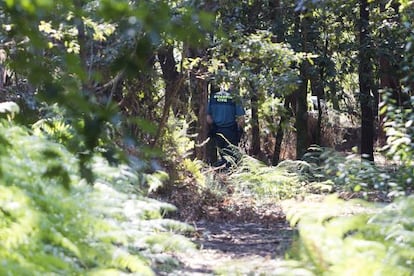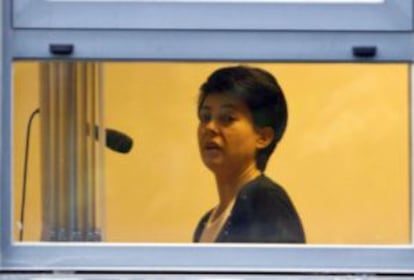Defense for Asunta’s parents seeks to exploit semen evidence debacle
Man initially investigated over 12-year-old’s murder because of lab mistake testifies at trial


The Asunta Basterra murder trial on Thursday reviewed one of the most puzzling episodes in the investigation into the September 2013 death of the 12-year-old girl.
On the night that her body was removed from the dirt track where it was found, near her parents’ country house in Teo, outside Santiago de Compostela, forensic investigators saw white stains of a biological nature on the collar of her shirt.
On the night of September 21, 2013, R.C.J. and his sister were having dinner at La Tranquera, a Colombian restaurant in Madrid
The original report indicated that the substance could have been semen, particularly since the victim was an underage female. However, an analysis of the body soon revealed that she had not been sexually assaulted.
But the incident temporarily threw a wrench into the wheels of the investigation and highlighted a major mistake committed at the Civil Guard’s criminology laboratory in Madrid – a mistake for which nobody has so far taken responsibility.
After looking into the matter for months, investigating magistrate José Antonio Vázquez Taín determined that the shirt had been contaminated at the lab when someone cut it with a pair of scissors that had previously been used on a soiled condom involved in a separate case.
Asunta’s shirt had been sent to Madrid from Galicia precisely because of existing stains that might shed some light on her death by suffocation on the night of September 21, 2013. Her adoptive parents, Rosario Porto and Alfonso Basterra, are the prime suspects in the case.
For a while, the lab contamination shifted suspicion on to R.C.J., a Colombian national who lives in Arroyomolinos (Madrid) and has a police record for sexual assault. At the time of Asunta’s death, he had just been released from prison over an assault that his victim reported to the Civil Guard. The latter had the condom used in the assault on their lab table, and that is where some of the semen allegedly ended up on Asunta’s shirt via the unsterilized scissors.
The charges against this man were finally dropped, but on Thursday of this week, the defense attorney for Rosario Porto used a few contradictions found in R.C.J.’s depositions to try to tear apart this man’s version of events.

In a video conference from a Madrid courthouse, R.C.J., his sister, a family friend and his wife (who was his fiancée at the time of the crime) all gave testimony at the murder trial, which is taking place in Santiago de Compostela.
On the night of September 21, 2013, R.C.J. and his sister were having dinner at La Tranquera, a Colombian restaurant in Madrid, where they took pictures with her cellphone and immediately uploaded them on to her Facebook wall. This fact supported R.C.J. in his claim that he did not know Asunta or her family, and that he had never even been to Galicia in all of 2013.
English version by Susana Urra.
Tu suscripción se está usando en otro dispositivo
¿Quieres añadir otro usuario a tu suscripción?
Si continúas leyendo en este dispositivo, no se podrá leer en el otro.
FlechaTu suscripción se está usando en otro dispositivo y solo puedes acceder a EL PAÍS desde un dispositivo a la vez.
Si quieres compartir tu cuenta, cambia tu suscripción a la modalidad Premium, así podrás añadir otro usuario. Cada uno accederá con su propia cuenta de email, lo que os permitirá personalizar vuestra experiencia en EL PAÍS.
¿Tienes una suscripción de empresa? Accede aquí para contratar más cuentas.
En el caso de no saber quién está usando tu cuenta, te recomendamos cambiar tu contraseña aquí.
Si decides continuar compartiendo tu cuenta, este mensaje se mostrará en tu dispositivo y en el de la otra persona que está usando tu cuenta de forma indefinida, afectando a tu experiencia de lectura. Puedes consultar aquí los términos y condiciones de la suscripción digital.








































